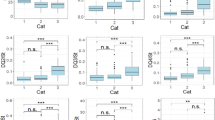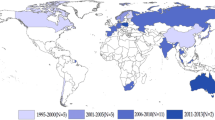Abstract
University league tables and policies aimed at world-class standing are adopted in promoting excellence in universities both at a national and an institutional level. With a focus on the research productivity of academics, the connection between research productivity and university policies such as personnel policy and funding allocation has been raised a big issue. How this phenomenon of building world-class universities has impacted on the research productivity of academics and, in particular, highly productive academics? This empirical study of research productivity in four Asian higher education systems, that is, mainland China, Hong Kong Special Administrative Region (SAR) China, Japan, and South Korea, uses data from the Second International Survey of the Academic Profession and measures research productivity by number of scientific journal publications over a three-year period.
Access this chapter
Tax calculation will be finalised at checkout
Purchases are for personal use only
Preview
Unable to display preview. Download preview PDF.
Similar content being viewed by others
References
Altbach, P. G. (2004). The costs and benefits of a World-Class Universities. Academe, 90. Retrieved April 10, 2012, from http://www.aaup.org/AAUP/pubsres/academe/2004/JF/Feat/altb.htm
Agarwal, P. (2009). Indian Higher Education: Envisioning the Future. New Delhi: Sage.
Bland, C. J., & Ruffin, M. T. (1992). Characteristics of a productive research environment: Literature Review. Academic Medicine, 67(6), 385–397.
Boyer, E. L. (1992). Scholarship Reconsidered: Priorities of the Professoriate. Princeton, NJ: Princeton University Press.
Cresswell, J. W. (1985). Faculty research performances: Lessons from the science and social sciences. In ASHE-ERIC Higher Education Report, 4. Washington, DC: Association for the Study of Higher Education.
Deem, R., Lucas, L., & Mok, K. H. (2009). The “world-class” university in Europe and East Asia: Dynamics and consequences of global higher education reform. In B. M. Kehm & B. Stensaker (Eds.), University Rankings, Diversity, and the New Landscape of Higher Education (pp. 117–134). Rotterdam: Sense Publisher.
Dill, D. D. (2009). Convergence and diversity: The role and influence of university rankings. In B. M. Kehm & B. Stensaker (Eds.), University Rankings, Diversity, and the New Landscape of Higher Education (pp. 97–116). Rotterdam: Sense Publisher.
Dundar, H., & Lewis, D. (1998). Determinants of research productivity in higher education. Research in Higher Education, 39(6), 607–631.
Fox, M. F. (1983). Publication productivity among scientists: A critical review. Social Studies of Science, 13(2), 285–305.
Hazelkorn, E. (2008). Learning to live with league tables and ranking: The experience of institutional leaders. Higher Education Policy, 21, 193–215.
Hazelkorn, E. (2009). Attitudes to rankings: Comparing German, Australian and Japanese experience. In S. Kaur, M. Sirat, & W. G. Tierney (Eds.), Addressing Critical Issues on Quality Assurance and University Rankings in Higher Education in the Asia Pacific. Penang, Malaysia: University Sains Malaysia.
International Centre for Higher Education Research Kassel. (2011). The Changing Academic Profession: Main Survey Results. Unpublished reports. Kassel: University of Kassel.
Khoon, K. A. Shukor, R., Hussan, O., Saleh, Z., Hamzah, A., & Ismail, R. (2005, December). Hallmark of a world-class university. College Student Journal. Retrieved April 10, 2012, from http://findarticles.com/p/articles/mi_m0FCR/is_4_39/ai_n16123684/
Levin, R. C. (2010, February 1). The Rise of Asia’s Universities. London: Speech to the Royal Society. Yale University Office of Public Affairs. Retrieved April 17, 2010, from http://opa.yale.edu/president/message.aspx?id=91
Lucas, L. (2006). The Research Game in Academic Life. Maidenhead: SRHE and Open University Press.
Marginson, S. (2011). Higher education in East Asia and Singapore: Rise of the confucian model. Higher Education, 61(5), 587–611.
National Science Board, US. (2010). Science and Engineering Indicators 2010. Retrieved April 10, 2010, from http://www.nsf.gov/statistics/seind10/
Niland, J. (2000, February 3). The challenge of building world-class universities in the Asian Region. Online Opinion. Retrieved April 10, 2006, from http://www.onlineopinion.com.au/view.asp?article=997
Prpic, K. (1996a). Characteristics and determinants of eminent scientists’ productivity. Scientometrics, 36(2), 185–206.
Prpic, K. (1996b). Scientific fields and eminent scientists’ productivity partners and factors. Scientometrics, 37(3), 445–471.
Reale, E., & Seeber, M. (2011). Organization response to institutional pressures in higher education: The important role of the disciplines. Higher Education, 61(1), 1–22.
Research Institute for Higher Education. (2008). The changing academic profession in international comparative and quantitative perspectives. Research Institute for Higher Education International Seminar Reports, 12. Hiroshima: Hiroshima University.
Salmi, J. (2009). The Challenge of Establishing World-Class Universities. Washington, DC: The World Bank.
Shanghai Jiao Tong University. (2010). Academic Ranking of World Universities – 2010. Retrieved May 8, 2012, from http://www.arwu.org
The World Bank. (2002). Constructing Knowledge Societies: New Challenges for Tertiary Education. Washington, DC: The World Bank. Retrieved December 2, 2008, from http://go.worldbank.org/N2QADMBNIO
Wood, F. (1990). Factors influencing research performance of university academic staff. Higher Education, 19(1), 81–100.
Yang, R. (2010). Advanced global strategy in China: The case of Tsinghua. In S. Marginson, S. Kaur, & E. Sawir (Eds.), Higher Education in the Asia-Pacific: Strategic Responses to Globalization. Dordrecht: Springer.
Author information
Authors and Affiliations
Editor information
Editors and Affiliations
Rights and permissions
Copyright information
© 2013 Sense Publishers
About this chapter
Cite this chapter
Postiglione, G.A., Jung, J. (2013). World-Class University and Asia’s Top Tier Researchers. In: Wang, Q., Cheng, Y., Liu, N.C. (eds) Building World-Class Universities. Global Perspectives on Higher Education, vol 25. SensePublishers, Rotterdam. https://doi.org/10.1007/978-94-6209-034-7_11
Download citation
DOI: https://doi.org/10.1007/978-94-6209-034-7_11
Publisher Name: SensePublishers, Rotterdam
Online ISBN: 978-94-6209-034-7
eBook Packages: Humanities, Social Sciences and LawEducation (R0)





